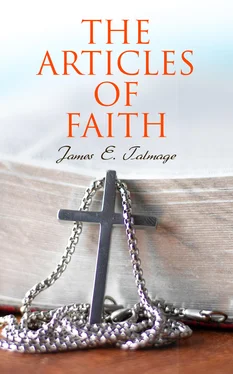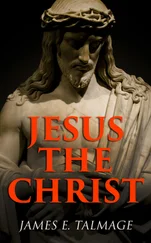12. The Father and the Son.—In the treatment of the "Personality of Each Member of the Godhead" (p. 41) and "Divine Attributes" (p. 42) no attempt has been made to segregate the references made to The Father and to The Son. It is to be remembered that the Personage most generally designated in the Old Testament as God or the LORD, is He who in the mortal state was known as Jesus Christ, and in the antemortal state as Jehovah. See the author's work, "Jesus the Christ," chap. iv. That Jesus Christ or Jehovah is designated in certain scriptures as the Father in no wise justifies an assumption of identity between Him and His Father, Elohim. This matter has been explained in a publication dated June 30, 1916, entitled "The Father and The Son; a Doctrinal Exposition by the First Presidency and the Twelve." This appeared in Improvement Era, August, 1916, and in a pamphlet of earlier issue. Excerpts therefrom follow: "The term 'Father' as applied to Deity occurs in sacred writ with plainly different meanings. Each of the four significations specified in the following treatment should be carefully segregated.
"1. 'Father' as Literal Parent. … Jesus Christ is the Son of Elohim both as spiritual and bodily offspring; that is to say, Elohim is literally the Father of the spirit of Jesus Christ and also of the body in which Jesus Christ performed His mission in the flesh. …
"2. 'Father' as Creator. A second scriptural meaning of 'Father' is that of Creator, e.g. in passages referring to any one of the Godhead as 'The Father of the heavens and of the earth.' … With this meaning, as the context shows in every case, Jehovah, who is Jesus Christ the Son of Elohim, is called 'the Father.' …
"3. Jesus Christ the 'Father' of those who abide in His Gospel". See Doc. and Cov. xxxiv, 1–3; xxxv, 1, 2; xxxix, 1–4; Mosiah xv, 10–13.
"4. Jesus Christ the 'Father' by Divine Investiture of Authority". See John x. 30; xvii, 11, 22; compare xiv. 28; see further v, 43; x, 26; III Nephi xx, 35; xxviii, 10; and Doc. and Cov. 1, 43.
LECTURE III.
TRANSGRESSION AND THE FALL.
Table of Contents
Article 2.—We believe that men will be punished for their own sins, and not for Adam's transgression.
TRANSGRESSION AND ITS RESULTS.
1. Man's Free Agency.—The Church holds and teaches as a strictly scriptural doctrine, that man has inherited among the inalienable rights conferred upon him by his divine Father, absolute freedom to choose the good or the evil in life as he may elect. This right cannot be guarded with more jealous care than is bestowed upon it by God Himself; for in all His dealings with man, He has left the mortal creature free to choose and to act, with no semblance of compulsion or restraint, beyond the influences of paternal counsel and loving direction.119 True, He has given commandments, and has established statutes, with promises of blessings for compliance and dire penalties for infraction; but in the choice of these, God's children are untrammeled. In this respect, man is no less free than are the angels and the Gods, except as he has fettered himself with the bonds of sin, and forfeited his power of will and force of soul. The individual has as full a measure of liberty to violate the laws of health, the requirements of nature, and the commandments of God in matters both temporal and spiritual, as he has to obey all such; in the one case he brings upon himself the sure penalties that belong to the broken law; as in the other he inherits the specific blessings and the added freedom that attend a law-abiding life. Obedience to law is the habit of the free man; 'tis the transgressor who fears the law, for he brings upon himself deprivation and restraint, not because of the law, which would have protected him in his freedom, but because of his antagonism to law.
2.The predominant attribute of justice, recognized as part of the Divine nature, forbids the thought that man should receive promises of reward for righteousness, and threats of punishment for evil deeds, if he possessed no power of independent action. It is no more a part of God's plan to compel men to work righteousness, than it is His purpose to permit evil powers to force His children into sin. In the days of Eden, the first man had placed before him commandment and law,120 with an explanation of the penalty which would follow a violation of that law. No law could have been given him in righteousness had he not been free to act for himself. "Nevertheless thou mayest choose for thyself, for it is given unto thee, but remember that I forbid it,"121 said the Lord God to Adam. Concerning His dealings with the first patriarch of the race, God has declared in this day, "Behold, I gave unto him that he should be an agent unto himself."122
3.When the brothers Cain and Abel brought their sacrifices before the Lord, the elder one became angry because his offering was rejected; then the Lord reasoned with Cain, and endeavored to teach him that he must expect results of his actions to follow in kind, good or evil, as he might elect:—"If thou doest well, shalt thou not be accepted? and if thou doest not well, sin lieth at the door."123
4.A knowledge of good and evil is essential to the advancement which God has made possible for His children to achieve; this knowledge can be best gained by actual experience, with the contrasts of good and its opposite before the eyes; therefore has man been placed upon the earth subject to the influence of good and wicked powers, with a knowledge of the conditions surrounding him, and the heaven-born right to choose for himself. The words of the prophet, Lehi, are particularly explicit: "Wherefore, the Lord God gave unto man that he should act for himself. Wherefore, man could not act for himself, save it should be that he was enticed by the one or the other. … Wherefore, men are free according to the flesh; and all things are given them which are expedient unto man. And they are free to choose liberty and eternal life, through the great mediation of all men, or to choose captivity and death, according to the captivity and power of the devil; for he seeketh that all men might be miserable like unto himself."124
5.Alma, another Nephite prophet, in speaking of those who had died, said they had gone "that they might reap their rewards, according to their works, whether they were good or whether they were bad, to reap eternal happiness or eternal misery, according to the spirit which they listed to obey, whether it be a good spirit or a bad one; For every man receiveth wages of him whom he listeth to obey, and this according to the words of the spirit of prophecy."125
6.Samuel, the converted Lamanite, upon whom the spirit of the prophets had fallen, admonished his wayward fellows in this wise: "And now remember, remember my brethren, that whosoever perisheth, perisheth unto himself; and whosoever doeth iniquity, doeth it unto himself; for behold, ye are free; ye are permitted to act for yourselves; for behold, God hath given unto you a knowledge, and He hath made you free; He hath given unto you that ye might know good from evil, and He hath given unto you that ye might choose life or death."126
7.When the plans for creating and peopling the earth were under discussion in heaven, Satan sought to destroy the free agency of man, by obtaining power to force the human family to do his will, promising the Father that by such means he would redeem all mankind, and that not one of them should be lost.127 This proposition was rejected, while the original purpose of the Father—to use persuasive influences of wholesome precept and sacrificing example with the inhabitants of the earth, then to leave them free to choose for themselves, was agreed upon, and the Only Begotten Son was chosen as the chief instrument in carrying that purpose into effect.
Читать дальше












